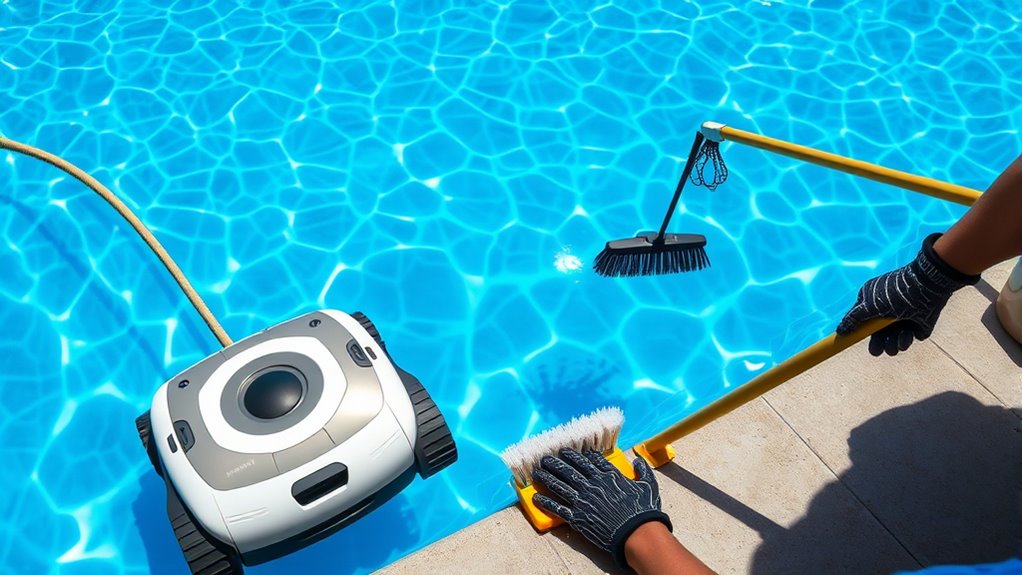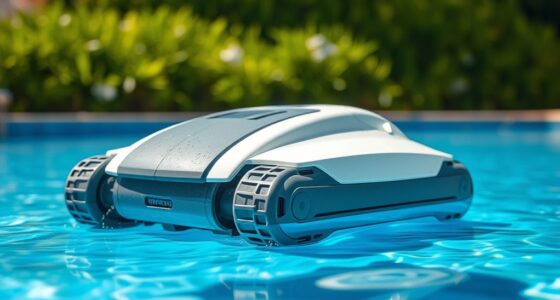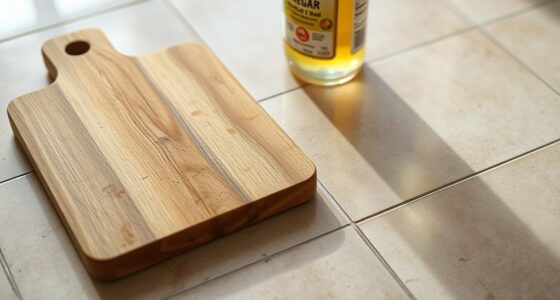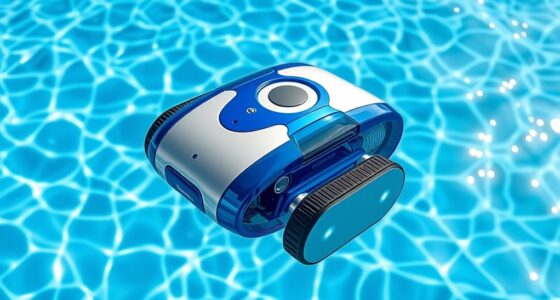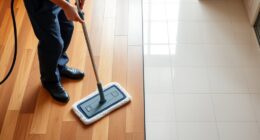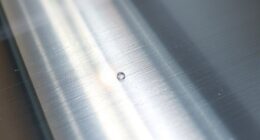Even with automatic pool cleaners, you still need to check water chemistry regularly, ensuring pH levels stay balanced. You should manually skim the surface for leaves and debris that automatic cleaners might miss. Cleaning and replacing pool filters keeps the water clear, while inspecting equipment prevents malfunctions. Monitoring water levels and brushing surfaces help maintain overall pool health. Following these manual tasks will keep your pool in top shape—stay with us to find out how to do it right.
Key Takeaways
- Regularly inspect and clean skimmer and pump baskets to maintain proper suction and prevent clogging.
- Brush and scrub pool surfaces weekly to prevent algae buildup and surface stains.
- Check and maintain pool water chemistry, including pH and chlorine levels, for optimal clarity and safety.
- Monitor and service pool equipment such as filters, pumps, and automatic cleaners to ensure efficient operation.
- Manually remove surface debris during early mornings or evenings to support automatic cleaner effectiveness.
Checking and Maintaining Water Chemistry
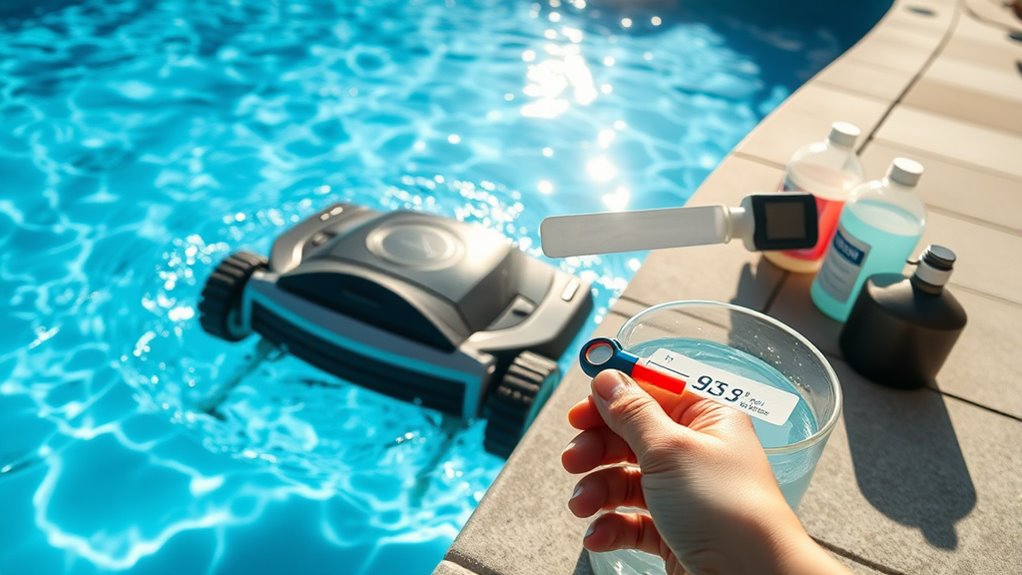
Maintaining proper water chemistry is essential for keeping your pool safe and clean. You need to regularly check your water’s pH levels and ensure they’re balanced, ideally between 7.2 and 7.6. Proper pH balancing prevents skin and eye irritation and keeps your pool equipment functioning correctly. It also plays a vital role in alga prevention, as unbalanced water can promote algae growth. Use a reliable test kit to monitor your water’s chemistry and adjust chemicals accordingly. Adding pH increasers or decreasers helps maintain optimal levels. Consistent testing and adjustments ensure your pool remains inviting and safe, reducing the likelihood of algae blooms and other issues that can compromise water quality. Staying on top of water chemistry is a simple but crucial step in effective pool maintenance. Understanding the importance of balanced water chemistry can help you prevent costly repairs and ensure a more enjoyable swimming experience. Additionally, proper chemical balance can extend the lifespan of your pool’s filtration system, saving you money on repairs and replacements. Regularly inspecting equipment functionality is also important, as mechanical issues can lead to water imbalance and other problems. Incorporating regular water testing routines can further improve your ability to maintain optimal conditions and catch potential problems early. Furthermore, using appropriate chemicals ensures that the water chemistry remains stable over time.
Skimming and Removing Debris Manually
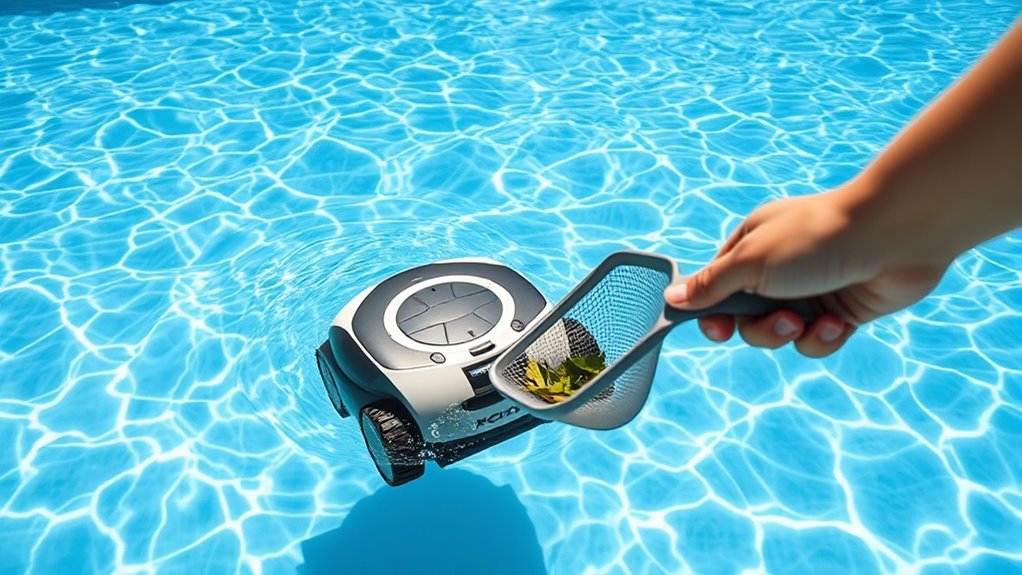
You can keep your pool clean by hand-removing floating debris with your skimming tools, making it easier to maintain clear water. Using the right tools efficiently and timing your efforts during early mornings or evenings helps prevent debris from sinking or spreading. Regular manual skimming guarantees your automatic cleaner works more effectively and keeps your pool sparkling.
Hand-Removing Floating Debris
When debris floats on the surface of your pool, removing it manually is an effective way to keep the water clean and clear. You can tackle various types of floating debris, such as leaves, insects, pollen, and twigs, with simple debris removal techniques. Using a net or skimmer, you can quickly gather debris before it sinks and causes water quality issues. Regularly checking and cleaning your skimmer basket prevents clogs and promotes ideal flow. For larger debris, reach in manually or use tongs to remove items safely. This simple routine not only improves water clarity but also reduces the workload on automatic cleaners. Incorporating knowledge of pool maintenance and essential oils for maintaining overall pool health can further support a fresh and inviting swimming environment. Understanding the importance of water chemistry helps maintain balanced pH levels and prevent algae growth, ensuring your pool stays pristine. Staying consistent with these manual tasks ensures your pool remains inviting and well-maintained. Additionally, being aware of electric pool equipment can help you troubleshoot and optimize your pool’s filtration system for better debris removal.
Using Skimming Tools Effectively
Using skimming tools effectively is essential for keeping your pool free of surface debris. You’ll want to quickly gather leaves, insects, and other floating matter before they sink or clog filters. To optimize debris collection, use a leaf skimmer or net, focusing on robotic navigation techniques for smooth, efficient coverage. Keep a steady, sweeping motion across the surface, paying attention to corners and edges. Regularly inspecting and maintaining your pool equipment can also help prevent dust and debris buildup in related recreational areas.
Timing Manual Debris Removal
Timing manual debris removal is crucial for maintaining a clean pool and preventing clogging of filters. Regularly skimming debris ensures your pool stays clear and reduces strain on your filtration system. When you perform manual removal at ideal times, you prevent debris from sinking or breaking apart, making cleanup easier. Keep an eye on the water surface, especially after storms or heavy use, to catch timing debris early. This proactive approach helps avoid larger messes that require more effort later. Proper timing also keeps algae and bacteria from thriving on organic material. Remember, manual removal isn’t just about cleaning; it’s about timing it perfectly for maximum efficiency. Indexed annuities can provide a balance between risk and reward, making strategic timing of manual tasks even more important in overall maintenance. Additionally, understanding automation in business can inspire you to develop more efficient pool maintenance routines that save time and effort, which is especially helpful when coordinating maintenance schedules to optimize cleanliness. Incorporating timing strategies into your routine ensures you stay ahead of potential issues, making your pool maintenance more effective and less labor-intensive.
Cleaning and Replacing Pool Filters
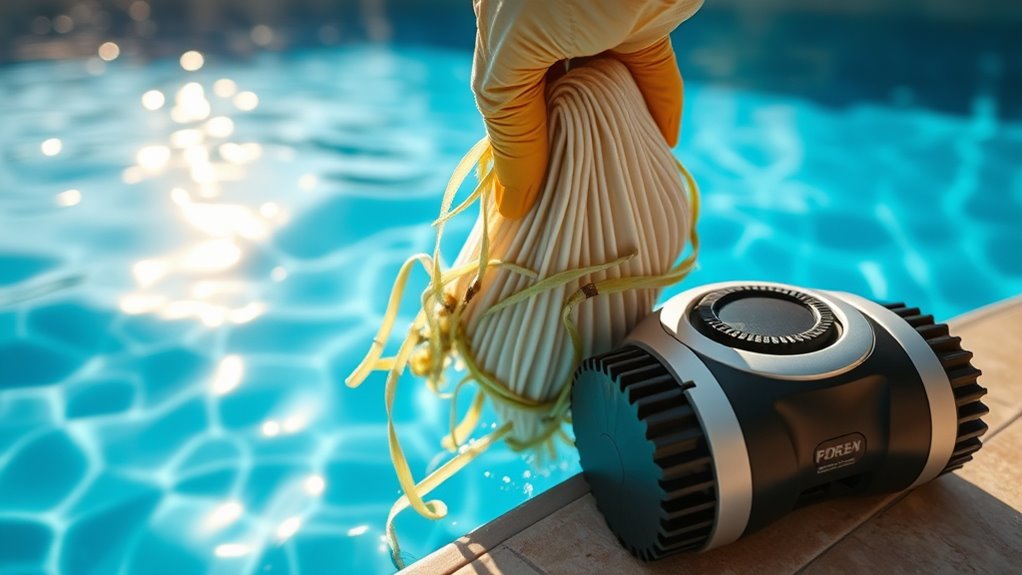
Regularly cleaning and replacing your pool filters is essential for maintaining clear, healthy water. Over time, filters trap dirt, oils, and debris, reducing their efficiency. You should perform filter cleaning weekly to remove buildup and prevent clogs, which can strain your system. When filters become too dirty or worn, it’s time for filter replacement to guarantee top-notch filtration. Always follow your manufacturer’s instructions for cleaning methods and replacement schedules. Regular maintenance keeps your automatic cleaner working effectively and prevents algae growth or cloudy water. Don’t forget to inspect your filters during routine checks, and replace them promptly when necessary. Proper filter care extends the life of your equipment and keeps your pool water sparkling clean.
Inspecting and Maintaining Pool Equipment
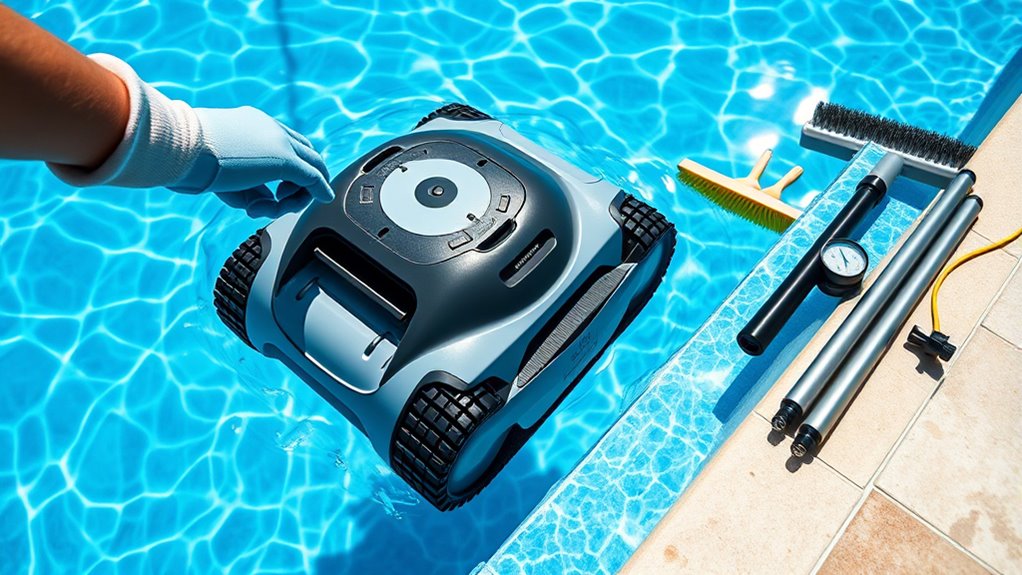
Maintaining your pool’s equipment is key to guaranteeing smooth operation and extending the lifespan of your system. Regular inspections help prevent costly repairs and keep your water crystal clear. Start by checking the pool pump for leaks or strange noises, which could indicate issues needing attention. Keep an eye on your chlorinator to ensure proper chlorine levels and perform chlorinator maintenance as recommended. Inspect hoses and fittings for cracks or blockages that could hinder circulation. Additionally, clean out the skimmer and pump baskets to promote efficient water flow. Don’t forget to examine electrical connections for corrosion or loose wires, which could compromise safety. Routine maintenance of your pool pump and chlorinator keeps your system running smoothly and saves you time and money in the long run. Being aware of operating hours for local stores can help you plan your maintenance and supply trips efficiently. Regular system checks are also recommended to identify potential problems early and ensure all components function correctly, including verifying that filtration systems are operating properly to maintain water clarity. Incorporating a scheduled maintenance routine can further enhance the longevity and performance of your pool equipment. Additionally, staying informed about industry trends can help you adopt new maintenance techniques and improve your pool care practices.
Monitoring Water Levels and Adding Water if Needed
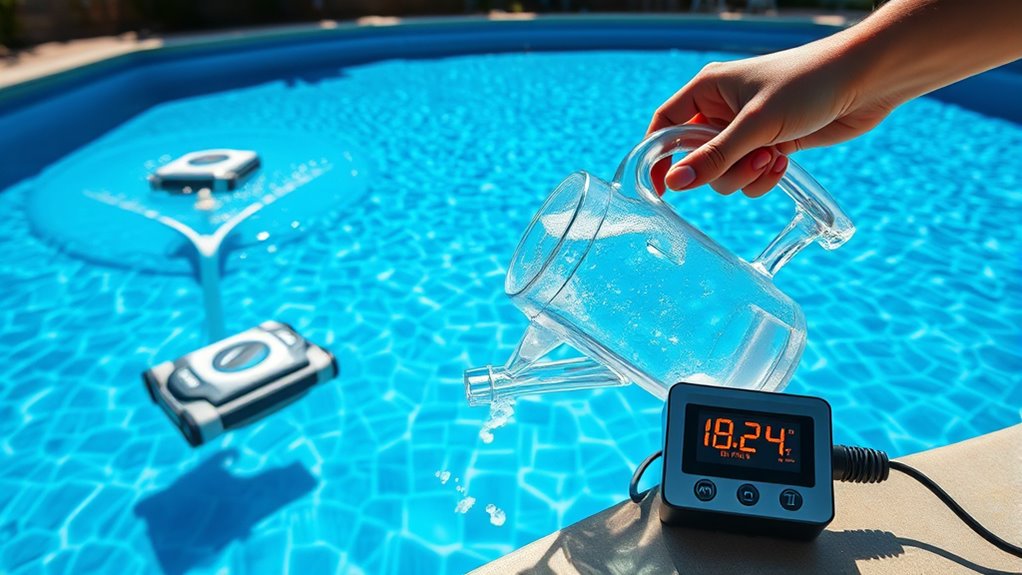
You should check your pool’s water level regularly to make certain it stays within the recommended range. Look for signs of water loss, like a lower surface or increased evaporation, to catch issues early. When needed, add water carefully to maintain proper levels and keep your automatic cleaner running smoothly. Ensuring proper water level regulation helps optimize system efficiency and prolongs equipment lifespan. Regular monitoring can also prevent issues related to overfilling or underfilling, which can impact the performance of your automatic cleaner. Understanding the optimal angles for pinball machines can also help you identify potential issues with your pool’s water distribution and circulation, ensuring your entire system operates efficiently.
Check Water Regularly
Since water levels can fluctuate due to evaporation, splashing, or backwashing, it’s important to monitor them frequently. Maintaining proper water levels ensures your automatic cleaner works efficiently and helps keep the chemical balance stable, which is vital for algae prevention. Regular checks also allow you to add water when needed, preventing the skimmer from sucking in air and damaging the pump. Using a water level indicator can make monitoring more accurate and convenient.
Recognize Water Loss Signs
Monitoring water levels regularly helps you catch early signs of water loss before it becomes a bigger problem. A noticeable drop in water height may indicate water evaporation or leaks. If your water level drops considerably, your pool chemicals can become unbalanced, leading to chemical imbalance issues that affect water clarity and safety. Keep an eye on the skimmer and pool edge for signs of water loss. Uneven water levels or constant refilling suggest you need to add water to maintain proper levels. Consistently low water levels can strain your pool’s filtration system and lead to further issues. By staying vigilant and recognizing these signs early, you can prevent more serious problems and keep your pool safe, clean, and properly balanced.
Properly Add Water
Maintaining proper water levels is essential for your pool’s ideal performance and safety. If the water drops below the skimmer or returns, it can disrupt water balance and hinder chemical treatment. To keep levels right, regularly monitor the water line and add water as needed. When adding water, use a garden hose with a filter to prevent debris and contaminants from entering. Be cautious not to overfill, which can cause overflow and affect water flow. Remember, proper water level ensures your automatic cleaner functions effectively and protects your pool equipment. Consistent checks help maintain perfect water balance, reducing chemical adjustments later on and keeping your pool safe and inviting. Regular water monitoring simplifies overall pool maintenance.
Brushing and Scrubbing Pool Surfaces

Regularly brushing and scrubbing your pool surfaces is essential to keep algae prevention and surface staining under control, especially since automatic cleaners might miss spots. By manually cleaning the walls, floor, and corners, you remove dirt and algae before they can settle and cause issues. Focus on areas prone to buildup, such as corners and steps. This helps maintain water clarity and prevents surface staining, which can become permanent if left untreated. Use a suitable brush or scrubber for your pool’s surface type, like vinyl, tile, or plaster. Doing this weekly ensures your automatic cleaner works more efficiently and reduces algae growth, keeping your pool cleaner, healthier, and more inviting. Regular maintenance also extends the life of your pool surfaces.
Ensuring Proper Operation of the Automatic Cleaner
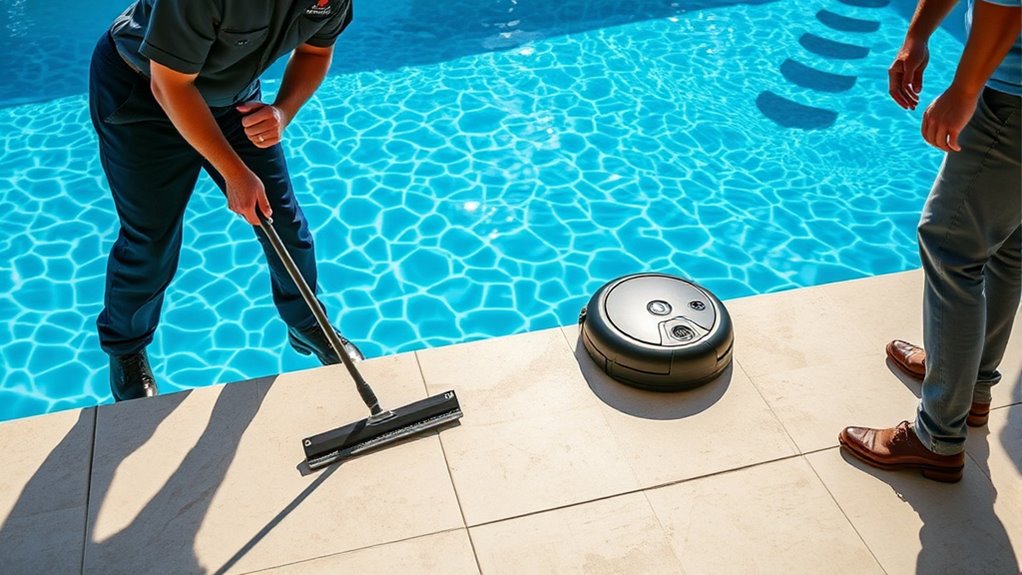
To keep your automatic cleaner working at peak performance, it’s important to guarantee it’s set up correctly and functioning properly. Start by checking that the cleaner’s connections are secure and the tracks or brushes are clean. Proper pool chemistry and chemical balancing are essential—imbalance can hinder cleaning efficiency. Regularly inspect and replace worn parts to prevent malfunctions. Ensure the skimmer and pump baskets are clear to maintain optimal suction. Additionally, verify that the cleaner’s navigation system isn’t obstructed by debris or algae.
- Confirm the cleaner’s connections and seals are tight
- Maintain proper pool chemistry and chemical balancing
- Clear debris from skimmer and pump baskets
- Regularly inspect and replace worn parts
Frequently Asked Questions
How Often Should I Manually Check My Pool’S Chemical Levels?
You should check your pool’s chemical levels at least twice a week. Regular chemical testing helps you monitor pH balancing and guarantee proper sanitizer levels. If you notice cloudy water or an odd smell, test more frequently. Maintaining balanced chemicals prevents algae growth and keeps your pool safe and clean. Don’t forget to adjust chemicals as needed, especially after heavy use or rain, to keep your pool inviting and healthy.
What Tools Are Best for Manually Skimming Debris From the Pool?
For manual skimming and debris removal, grab a good quality leaf skimmer or net with a long handle. These tools let you efficiently remove leaves, bugs, and other debris floating on the water’s surface. Look for durable, fine-mesh nets that won’t tear easily. Regularly using a leaf skimmer keeps your pool clean and helps maintain balanced chemical levels, even when automatic cleaners are in use.
How Do I Identify When Pool Filters Need Replacing?
Spotting subtle signs of filter failure helps you stay ahead. When your pool’s flow feels feeble, or water clarity worsens, it’s time to think about filter lifespan and replacement indicators. You might notice increased pressure readings or debris bypassing the filter. Regularly check your pressure gauge and look for stubborn dirt or cloudiness. These clues tell you it’s time to replace your filter for peak performance and pristine, sparkling water.
What Signs Indicate Pool Equipment Needs Professional Repair?
If your pool equipment isn’t working properly, look for signs like persistent pool heater issues or unusual pump noise problems. These often indicate you need a professional repair. Don’t ignore strange sounds or inconsistent heating, as they could signal underlying issues. When you notice these signs, it’s best to call a professional to diagnose and fix the problem, preventing costly damage and ensuring your pool stays in top shape.
How Can I Prevent Algae Growth Despite Automatic Cleaning?
To prevent algae growth despite automatic cleaning, focus on frequent chemical balancing and proper filtration. Regularly test and adjust pH and sanitizer levels to keep algae at bay. Consistent circulation and cleaning disrupt algae’s growth cycle. Keep pool water clear by maintaining a healthy balance, preventing algae from gaining a foothold. Remember, vigilant vigilance and vibrant chemical control are your best allies against algae invasion.
Conclusion
Even with an automatic cleaner doing the heavy lifting, keeping your pool sparkling is like tending a garden—you still need to pull weeds and water the plants. Your manual tasks, from checking water chemistry to inspecting equipment, are the roots that keep everything healthy and functioning. By staying on top of these chores, you guarantee your pool remains a invigorating oasis, shining bright like a well-tended garden in full bloom.
